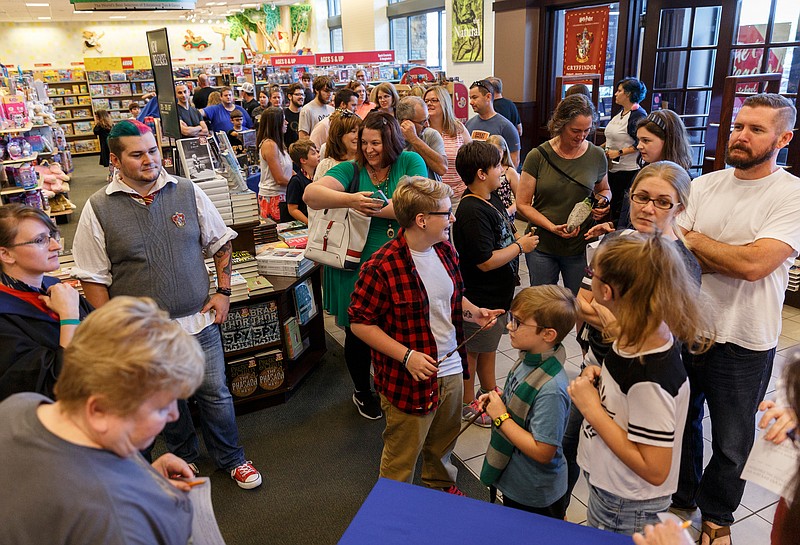Everything old is new again - even fantasy book controversies.
A recent kerfuffle involved the banning of Harry Potter books by a Nashville Catholic school because a school priest decided, according to The Associated Press, "the books could cause a reader to conjure evil spirits."
The first of these books, "Harry Potter and the Sorcerer's Stone" ("Harry Potter and the Philosopher's Stone" in Great Britain), was released in 1997. Our son and only child was 3 at the time, but when he was a little older we exposed him to the books that had taken the U.S. by storm.
Even at the time, the books by J.K Rowling were controversial to some because the characters, children and adults, were wizards and witches and cast spells, including even a death spell.
But what we did - it was my wiser wife's idea - was to listen to the books together on audio cassettes and later audio CDs. Usually, it was the two of them on rides to and from school, but when the three of us were in a car, we could all listen together. That way, she, or both of us, could answer any question our son had about any aspect of the book.
From "Sorcerer's Stone" to "Harry Potter and the Deathly Hallows," published in 2007, my wife and son listened to the series. Meanwhile, I caught up by listening in my own car so I wouldn't be too far behind them.
Though my wife and I are both readers, the audio books proved to be an even greater treasure than one might imagine. They are read by English actor Jim Dale, the lyricist for the Academy Award-nominated song "Georgy Girl" in 1966, a star in the Walt Disney film "Pete's Dragon" in 1977 and the Tony Award-winning actor in "Barnum" in 1980.
If you know the Harry Potter books, they have scores of characters, and the actor voiced every last one of them, counting 134 in "Harry Potter and the Order of the Phoenix" and 146 for "Deathly Hallows." He quite deservedly earned seven Grammy nominations and two wins for his work in the series.
To my knowledge, our son has never conjured an evil spirit and today is the youth director in a local church. If the books did anything, we hope they inspired an active imagination and believe they helped him develop an ability to interact positively with children and youth.
Listening to the books reminded me of how fortunate I was to have a mother who read to her children. She read to my sister and me (16 months apart) a variety of books, but the ones I remember most had probably also had been read to my older brothers and perhaps to my mother's younger siblings.
Called "My Book House" books, the two I recall had black hard covers tattered from heavy use. The pages were yellowed, and many individual pages had come loose from the binding of the book and had tears and pieces missing from corners.
My recollection is one volume called "In the Nursery" and one, the one we probably requested most, called "Story Time." In it, according to an online post, are works by Samuel Taylor Coleridge, Aesop, Aristophanes, Christina Rossetti, John Keats, Sir Walter Scott, Henry Wadsworth Longfellow, William Blake, Clement Moore, Walter de la Mare, Hans Christian Andersen, Edward Lear, Mary Mapes Dodge, Hector Berlioz (adaptation from his opera), Eugene Field, Beatrix Potter, Walt Whitman, Heinrich Heine, Leo N. Tolstoy, Robert Burns and others.
Among the some 90 selections are "The City Mouse and the Country Mouse," "The Gingerbread Man," "The Little Engine that Could," "The Little Red Hen," "The Tale of Peter Rabbit," "The Teddy Bears' Picnic," "The Ugly Duckling" and "Wynken, Blynken, and Nod."
Like the Harry Potter books, they evoked images of characters doing things we knew were fiction but nevertheless stoked our imagination. You just can't help picturing the scene and then giggling at the Edward Lear "Book of Nonsense" selection, for instance, that reads: "There was an Old Man with a beard, Who Said, 'It is just as I feared' - Two Owls and a Hen, Four Larks and a Wren, Have all built their nests in my beard!"
If we had any question about any of the selections, we could ask our mother.
Of course, many children today don't have parents to whom they can ask questions or who might be willing to answer them. But that's no reason to ban books that invite magical thinking. Teachers, librarians, other parents and even older siblings can provide context or answers to questions that might arise.
The priest at the Nashville school where the book was banned said he consulted exorcists in the U.S. and Rome who recommended removing the Potter books. It would have been better if he'd used the time and effort he put in the exercise to do what a local Chattanooga group of mothers is doing - trying to install a classroom library in each of Hamilton County's 12 Opportunity Zone schools.
Fostering the love for reading, after all, is more akin to lighting a candle than cursing the darkness.
